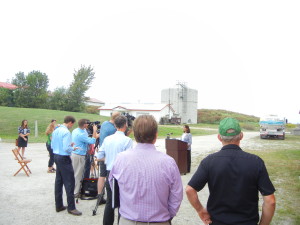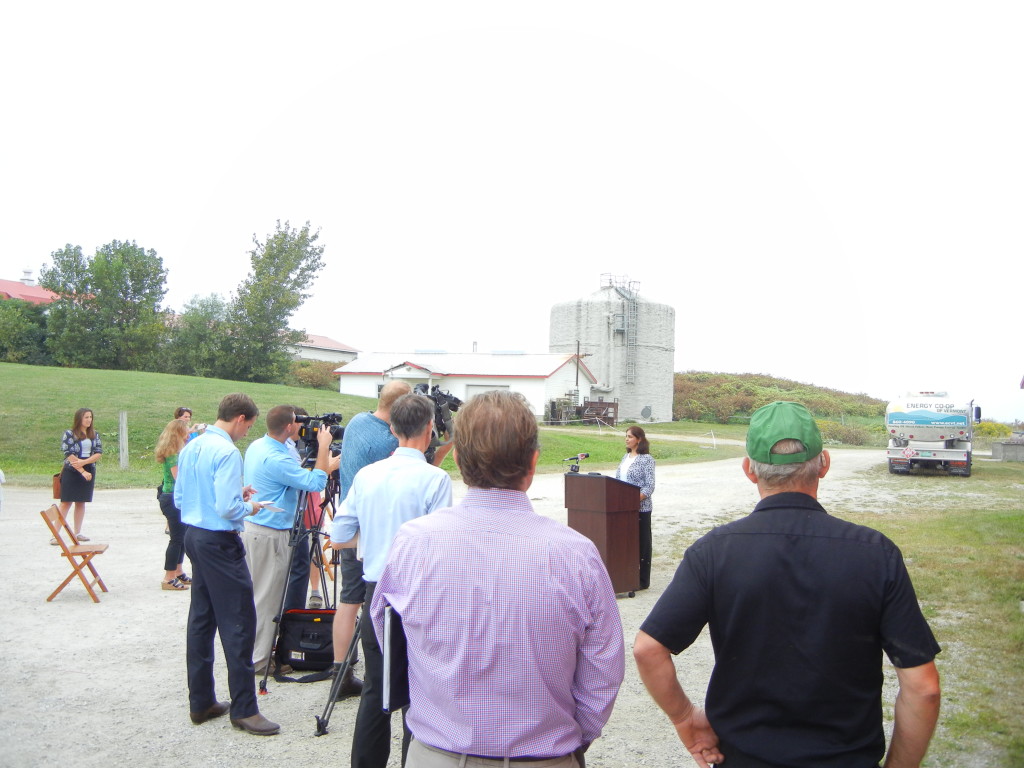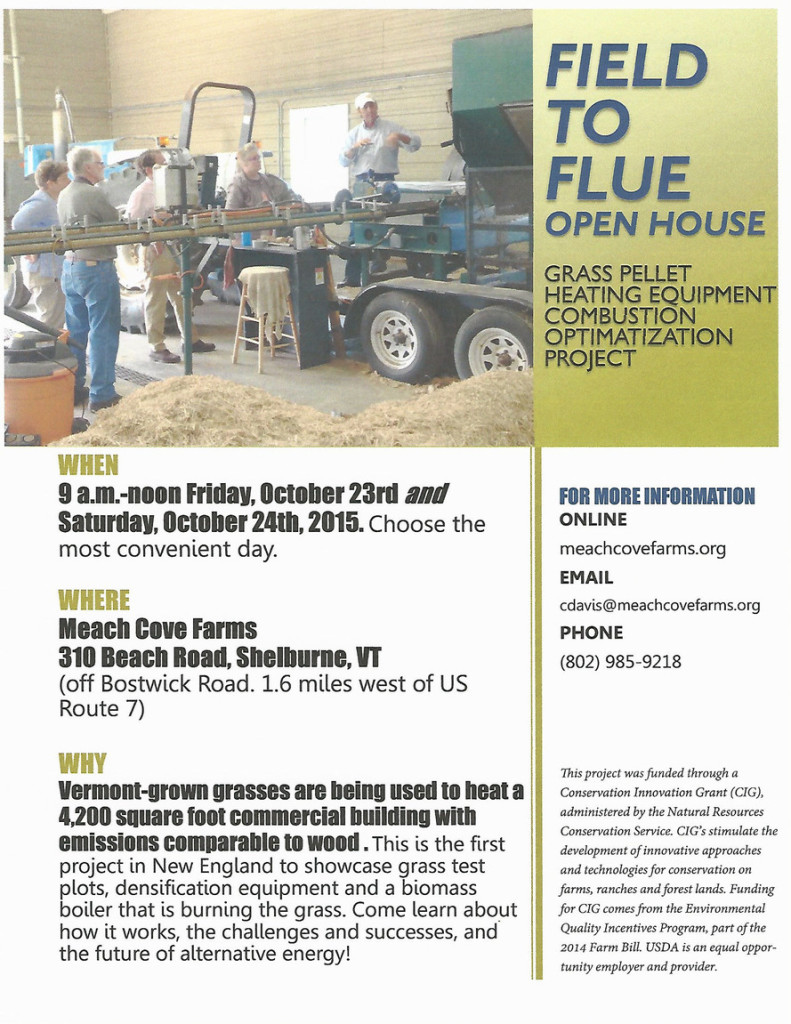 Algae for biofuel has been a long time component of the local biofuel production for local use model pioneered by the Vermont Bioenergy Initiative. At the forefront of these efforts has been Anju Dahyia, a VBI grantee, lead biofuels instructor at the University of Vermont, and president of General Systems Research (GSR) Solutions. When the Vermont Fuel Dealers Association received a USDA Rural Business Enterprise Grant to utilize waste materials from Vermont farms to produce sustainable distillate fuel, Anju and GRS Solutions were already in a prime positon to conduct the necessary research.
Algae for biofuel has been a long time component of the local biofuel production for local use model pioneered by the Vermont Bioenergy Initiative. At the forefront of these efforts has been Anju Dahyia, a VBI grantee, lead biofuels instructor at the University of Vermont, and president of General Systems Research (GSR) Solutions. When the Vermont Fuel Dealers Association received a USDA Rural Business Enterprise Grant to utilize waste materials from Vermont farms to produce sustainable distillate fuel, Anju and GRS Solutions were already in a prime positon to conduct the necessary research.
GSR is developing a method of producing algae biofuel to replace traditional fossil fuels in motor vehicles, heavy farm equipment, and even airplanes at Charlotte’s Nordic Dairy Farm as a second tier to the already operational anaerobic digesters contributing to Vermont’s distributed energy generation grid. The process to produce algal biofuel has the potential to prevent nutrients such as phosphorus and nitrogen from making their way into local lakes and waterways. Nordic Dairy Farm’s owner, Clark Hinsdale, explained at a recent press event on his farm: “the best way to capture excess nutrients on farms is to never let them get beyond the boundaries of the farmstead.”
The current anaerobic digestion system “Cow Power,” utilized by Green Mountain Power, functions by using the methane byproduct harvested from constantly produced cow manure to make electricity that then is sold to Green Mountain Power customers. The research done by GSR focuses on another byproduct of digestion – the nutrient dense liquid waste, previously left unused for power purposes.
The oleaginous algae strains that Anju Dahyia has been working with since 2008 thrive on this dense waste and after the algae has consumed the available nutrients, the creation of the distillate fuel can begin. The result makes the process a closed loop system, and means that dairy farmers like Nordic Dairy (whose cows produce up to a ton of manure a day) would be able to sell algae derived biofuel to local fuel dealers and create granular organic fertilizer. According to Dahyia, Hinsdale’s 300 cows alone have the potential to produce anywhere between 20,000 to 30,000 gallons of biofuel each year.
The cost of production is estimated at $20 dollars per gallon, but Dahyia thinks that with increased scale will come a decreased price. At the recent press conference at the Nordic Dairy Farm site early in September, Mary Powell of Green Mountain Power outlined how the company is working with GSR Solutions to help increase scale and add more small refineries that mimic this operation. She went on to note the resiliency a community-sized digester refinery can add to a microgrid.
Speaking to ABC local 22 News, Matt Cota, Director of the Vermont Fuel Dealers Association added, “We know that bio-heat, renewable blended fuel, combined with heating oil works in customers tanks and burners, so if we can source that locally, it would be a great thing for Vermont’s economy, for Vermont famers, Vermont fuel dealers and consumers all across Vermont.”
Richard Altman of the non-profit Commercial Aviation Fuels Initiative was also in attendance and trumpeted that “community-scale digester-refineries in the region might be feasible by 2020,” noting that this project is just a start.
Also on the horizon, GRS Solutions is already working to go further with this technology by incorporating food waste into this digester system. While this system may be in its early stages, one thing is for sure, Vermont energy stakeholders are lining up to show their support and contribute to this more than viable option for local energy production.
For more watch the local WCAX coverage of the September 3rd press conference and to learn more about Algae Bioenergy in Vermont see our other post Algae Biofuel – Vermont’s Search for Viable and Cost-Effective Methods
19 Oct 2015
Field to Flue Open House at Meach Cove Farms

Vermont-grown grasses are being used to heat the Biomass Building – a 4,200 square foot commercial building at Meach Cove Farms in Shelburne. Local residents, community leaders, and renewable energy enthusiasts are invited to visit Meach Cove Farms Friday, October 23 – Saturday, October 24 for an Open House to learn how grass pellets are generating heat in a biomass boiler – an emerging source of bioenergy in Vermont.
Meach Cove Farms is a 1,000-acre certified organic farm primarily growing soy beans, wheat, rye, and corn as well as wine grapes, woodlands, and switchgrass trial plots for use in grass energy production. The Open House will offer a complete demonstration of the Grass Pellet Heating Equipment Combustion Optimization project – the first project in New England to showcase grass test plots, densification equipment, and an EvoWorld biomass boiler that burns the grass.
Meach Cove Farms began collaborating with Dr. Sidney Bosworth of the University of Vermont College of Agriculture and Life Sciences and the Vermont Bioenergy Initiative in 2009 to assess the potential of different species of grass as solid biofuel for heating applications.
In September 2011 Meach Cove Farms was awarded an USDA Natural Resources Conservation Service Conservation Innovation Grant to research the feasibility of Vermont grown grass pellets and heating equipment potential as an emerging renewable energy source in Vermont. The biomass boiler being featured at the Open House was funded through a Conservation Innovation Grant (CIG) administered by the Natural Resources Conservation Services.
IF YOU GO:
Meach Cove Farms is located at 310 Beach Road in Shelburne (off Bostwick Road, 1.6 miles west of Rte 7). The Open House runs from 9 am – 12 noon both Friday and Saturday, October 23-24. There is no cost and both days are open to the public. More info at www.meachcovefarms.org, 802-985-9218.
![12038666_988361397888752_7565829410015974342_o[2]](https://vermontbioenergy.com/wp-content/uploads/2015/10/12038666_988361397888752_7565829410015974342_o2-1024x731.jpg) On October 6th, Seventh Generation and the University of Vermont welcomed the 45th US Vice President, Al Gore at Ira Allen Chapel on the university’s campus. The highly anticipated speaking engagement entitled “The Climate Crisis and the Case for Hope,” which is part of an Energy Action Seminar Series facilitated by UVM Energy Alternatives, was truly an emotional roller coaster and had Gore left the stage at the halfway mark, all in attendance would have gone home rather depressed. “We are going to win this struggle” he stated, “the question is how quickly we will win,” Gore remarked before elaborating on the deep sinkhole humanity has fallen into.
On October 6th, Seventh Generation and the University of Vermont welcomed the 45th US Vice President, Al Gore at Ira Allen Chapel on the university’s campus. The highly anticipated speaking engagement entitled “The Climate Crisis and the Case for Hope,” which is part of an Energy Action Seminar Series facilitated by UVM Energy Alternatives, was truly an emotional roller coaster and had Gore left the stage at the halfway mark, all in attendance would have gone home rather depressed. “We are going to win this struggle” he stated, “the question is how quickly we will win,” Gore remarked before elaborating on the deep sinkhole humanity has fallen into.
The lecture followed a path most familiar with the former vice president’s advocacy would expect. The rising atmospheric greenhouse gas (GHG) levels that we are witnessing come from a variety of sources, but as Gore pointed out “the main problem is burning of fossil fuels, when we address this, the rest will fall into place.” The first part of the lecture really focused on the crisis. The audience watched in horror footage of major weather events, many have seen before, but taken in all at once really underline the major recent changes that we have seen in our global weather patterns. Gore noted that of the “14 of the hottest years on record have been in the last 15 years,” and that the average temperature at night during this time has increased, meaning that people and the planet, really can’t get a break from the heat.
Gore went on to talk about the cost of carbon, or as he tried to drive home, the lack of cost it represents to our economy. “We need to put a cost on carbon,” he noted “put a cost on denial” he then continued in reference to those who deny climate change. This statement was met by large applause by those who filled Ira Allen Chapel, hitting home for a crowd that will likely be talking a lot about carbon pricing in the upcoming legislative session. Political instability, floods and mudslides, wildfires, drought, storm damage, dying coral, infrastructure loss, species extinction, melting glaciers, famine water security, ecosystem loss, our way of life, infectious disease, and sea level rise all represent the cost of carbon we are already paying Gore noted on a slide with an animated cash register racking up the cost, concluding “there is a financial risk to using fossil fuels”
It’s worth noting, that this notion does not make Gore an outlier anymore. Just last week the Governor of the bank of England, Mark Carney echoed the same message when he spoke on the increase of major weather events and the related financial cost at meeting of leading insurers at Lloyd’s of London. Additionally, going back to last year, the department of defense listed climate change as an agitating factor in areas already experiencing political instability.
As was said earlier, if Gore had sent everyone home after the “The Climate Crisis” part of his lecture, without the “Case for Hope” portion, everyone there would have a pretty doomy and gloomy demeanor for weeks to come. Instead, the mood took a 360 change with Gore trumpeting the triumphs of the past year that have put humanity on a course towards beating climate change. Among these he gave Burlington credit for achieving 100% renewable energy. He went on the new power generated in 2014 three quarters of it was renewable energy, and reflecting on the fact that those who still deny climate change can agree, renewables just make economic sense.
To close, Gore instructed the audience, “always remember, that political will is a renewable resource.” As Vermont and the rest of the nation watch national and local campaigns for political office start up in which politicians’ attention, or potential lack of attention, can greatly shape our climates future, let’s hope that holds true. Leaving Ira Allen Chapel, one couldn’t help but feel a sense of optimism, and optimism is definitely a renewable resource.
The full seminar “The Climate Crisis and the Case for Hope” can be heard courtesy of the Gund Institute for Ecological Economics
05 Oct 2015
2015 New Economy Week

The 2015 Vermont New Economy Week starts Saturday October 10th and runs until Saturday the 17th, with plenty of free opportunities to experience public conversation about the ideas that can transform society and build an economy where people and the planet matter. The New Economy movement is “a people-driven approach to achieving prosperous communities, successful businesses, and healthy environments.” Participants in the Vermont New Economy Week can experience this vision, learn of opportunities to get involved, and see the progress of the Vermont New Economy. One such opportunity is part of the ongoing Energy Action Seminars occurring at the University Of Vermont, featuring Yoram Bauman PhD, the world’s only “Stand-up” Economist and a RE2015 keynote Speaker, who will discuss “Carbon Taxes, Why We Need Them.”
The Vermont New Economy Week falls one month before the New Economy Coalition hosts the national “New Economy Week: From Austerity to Prosperity” from November 9th to the 15th. Over a five day period, this national week will seek to highlight five “pressing challenges” by releasing original online content ranging from interviews, traditional publications, and Twitter conversations. The five pressing challenges in which the New Economy Coalition hopes spark a conversation around with the intention to bring societal change that can build an economy where the planet and people matter are,
- Day 1:Good Work and Opportunity for All
- Day 2:Building an Economy Where #BlackLivesMatter
- Day 3:Democracy Versus the 1%
- Day 4:A People’s Climate Agenda
- Day 5:Enough to Go Around
Almost all of these events are free and open to the public, with a few that suggest a small donation so those hosting the events can continue their work re-envisioning our economic system. For more information on the Vermont New Economy Week 2015 events below, read more on the Donella Meadows Institute page! To learn more about New Economy Coalition’s “New Economy Week: From Austerity to Prosperity” from November 9th to the 15th visit http://www.neweconomyweek.org/
For more about reimaging the Vermont economy, read our post Summit on Creating Prosperity and Opportunity Confronting Climate Change – Looking Back and Looking Forward
Vermont New Economy Week Opportunities
- Prelude to New Economy Week, October 10
- 10:00am-2:30pm— Weaving Well-Being Festival, State House Lawn, Montpelier
- Monday, October 12
- 6:00pm-9:00pm — Carbon Taxes, Why We Need Them, Energy Action Seminar, 108 Lafayette Hall, UVM, Burlington
- Wednesday, October 14
- 2:00pm-6:30 pm —Investing in the New Economy: Transforming Investments for Climate and Community, Chase Center, Vermont Law School, South Royalton
- Thursday, October 15
- 5:00pm-6:30pm — Green Drinks: Divestment for Sustainable Investment, with guests Gwen Hallsmith, author of “Vermont Dollars, Vermont Sense” and Steve Aldrich of the White River Investment Club, Worthy Kitchen, Woodstock
- 6:00pm-9:00pm —Worker Co-ops in the New Economy: An Evening of Short Films and Discussion, Artsriot, Burlington
- Friday, October 16
- 4:30-6:30 pm – Who is Responsible for Climate Change? Perspectives from Science, Ethics, Policy, and Law. Sustainability Solutions Cafe’, Filene Auditorium, Dartmouth College, Hanover
- Postlude to New Economy Week, Saturday, October 17
- 9:30am-3:30pm—Vermont Interfaith Power and Light Conference “Leading Action on Climate: Tools for Faith Communities”, Christ Episcopal Church, Montpelier
- 6:00 – 8:00 pm – New Economistas CD Release Party, Bagito’s Restaurant, Montpelier








